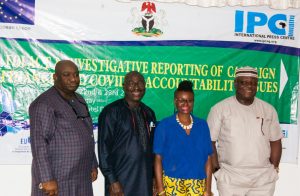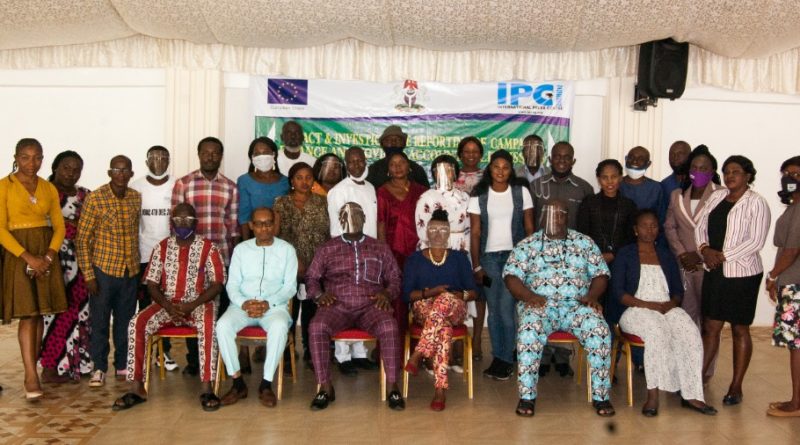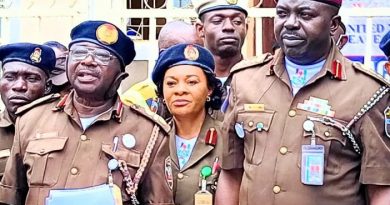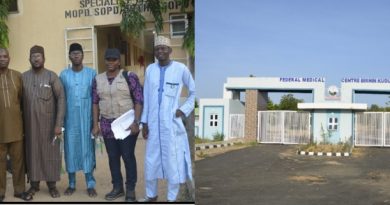FREEDOM OF lNFORMATION : IPC/Stakeholders urge Journalists to utilize FOI Act
Oru Leonard
The IPC stakeholders involved in the propagating of freedom of information in Nigeria has urged journalists to step up action in the utilisation of the Freedom of Information Act 2011.
The call was made at Abuja on Tuesday, during a media training workshop themed “Using the Freedom of Information (FOI), Act for Investigative Reports on Campaign Finance and Covid-19 Accountability Issues”.
Experts are of the view that the FOI Act is underutilized by citizens in the country going by the low level of awareness and monitoring of government programs going on finances.
A random sample carried in a crowd of fifty elites revealed that only 8 have read the the FOI Act in part and none has read it back to back.
The above validated the timely
media training workshop on where journalists were urged to
be more acquainted with FOI Act for effective investigation and reporting of campaign and covid-9 finances.
Resource persons and Journalists were brought from various parts of the country to to dig deep into the FOI Act and its application especially on campaign and covid-19 finances.

Speaking, the Executive Director, Media, International Press Centre (IPC), Mr Lanre Arogundade who presented a paper on The Role of the Media in Ensuring Good Governance and Government Accountability”, urged journalists to deploy investigative methods in the reporting of COVID-19 issues, just as he also advised the media to include women, people with disability, children and rural dwellers in political discourse.
According to him, “While not being oblivious of the obstacles that daily confronts us including all forms of threats by the government and the political class, media professional associations and bodies should be proactive and must realise that our best defense lies in sticking to good journalism”.
Earlier in his remarks, the Executive Director of Media Rights Agenda, Mr Edetaen Ojo who also presented a paper on ” Understanding the Key Features of the FOI Act, 2011″,said that the workshop would enhance the capacity of citizens especially the media, civil society organisations and other key stakeholders on the use of FoI Act, to hold all relevant agencies and actors accountable during electoral processes and COVID-19 financing. He also encouraged journalists to regularly report on political campaign finance issues as well as the covid-19 pandemic, in order to check political campaign financing and ensuring transparency and accountability towards government’s response to the COVID-19 pandemic.
He noted that effective regulation of political campaign financing is essential to the success of Nigeria’s quest for free, fair and credible elections, saying that transparency and accountability are imperative in curtailing the spread of COVID-19 and to mitigate its negative economic impact on the citizens.
He explained that Section 22 of the constitution has given journalists and citizens the onus of holding government responsible for financial spendings, adding that active citizenry is equally needed
The Director, Centre for Social Justice, CSJ, Abuja, Mr. Eze Onyekpere in his presentation gave insights on how to understand and report campaign finance and political expenditure frameworks and issues. “Journalist should leverage on the FOI Act to demand for proper accountability of funds especially the COVID-19 donor and electoral campaign funds”, he stated.
The Award winining Ivestigative Journalist, Ms Tobore Ovuorie spoke on ” Using Investigative Reporting Techniques to Monitor Compliance with Campaign Finance and Political Expenditure Regulations”.
The two days workshop
The workshop was designed to equip journalists with appropriate skills to engage in the reporting of democratic accountability, in order to check impunity in the electoral process and ensure that elected politicians would account for their campaign promises.
was organised by IPC, with the support from European Union- Support to Democratic Governance in Nigeria (EU-SDGN).




